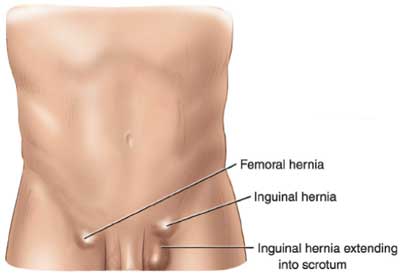Hernia is the externalization of tissue inside the abdomen. It occurs when parts of the intestine gets out of the abdomen through an opening called the hiatus. This weakness of the connective tissue occurs mainly in the groin and umbilical zones.
Tissue’s weakness is often congenital, but may be caused by excessive exercise, muscle weakness or by aging connective tissue.
Umbilical and incisional hernia (primarily caused by poor healing of the incisions above) represent 20% of cases of hernia. In 80% of cases were inguinal hernia.
Men over 50 years have a higher risk of hernia
In men, the inguinal hernia occurs when the inguinal canal does not close after birth. During fetal development, the testicles are formed in the abdomen and, thereafter, it descends through the scrotum and the groin and then, usually, the channel is closed.
Inguinal hernia may occur in the early moments of life of the newborn, but is more common among older men. With aging, muscles, respectively the abdominal muscle that forms the walls of the inguinal canal becomes increasingly weaker.
Physical exertion (lifting, moving heavy loads) can often cause sagging and appearance of groin hernia. For older people, it can be caused by weakness of the connective tissue.
Persistent constipation, which hampers particularly strong abdominal muscles can accelerate the occurrence of hernia. Very rarely, hernia may occur during an accident where the body tissue breakdown.
The most common symptoms of inguinal hernia are:
– Light tightness sensation
– Intensified pain during defecation, as a result of abdominal pressure and pain during exercise and cough.
– Digestive disorders
– Visible and palpable swelling at the site of pain
Treatment
In all cases, patients should consult their doctor because without treatment or complex intervention, hernia does not heal by itself. Sleeping on the back reduces pain intensity for a short period of time, and if the operation is performed, the patient must avoid effort during the first few months. Also, are recommended light exercises to strengthen abdominal muscles, but only as specified by the physician.
Untreated hernias can lead to serious complications
Surgery is the only therapeutic option to cure hernia, and if completed in early stage, it does not present any risks or complications. There are situations when the patient ignores the symptoms and avoid surgery, mostly because of fear. This can lead to rupture of the intestine and can lead to intestinal blockage loop. Furthermore, the situation worsens by hampered blood circulation, necrosis of the intestinal wall and even breakage – with particularly serious consequences because of bacteria that can cause infection of the peritoneum.
How to avoid hernia?
Inguinal hernia in infants can not be prevented, but in adults, the situation is different, and we can prevent it if we pay attention that the abdominal muscles to not become “lazy” in time. Also, you must not force your body with weights that can hardly face.

